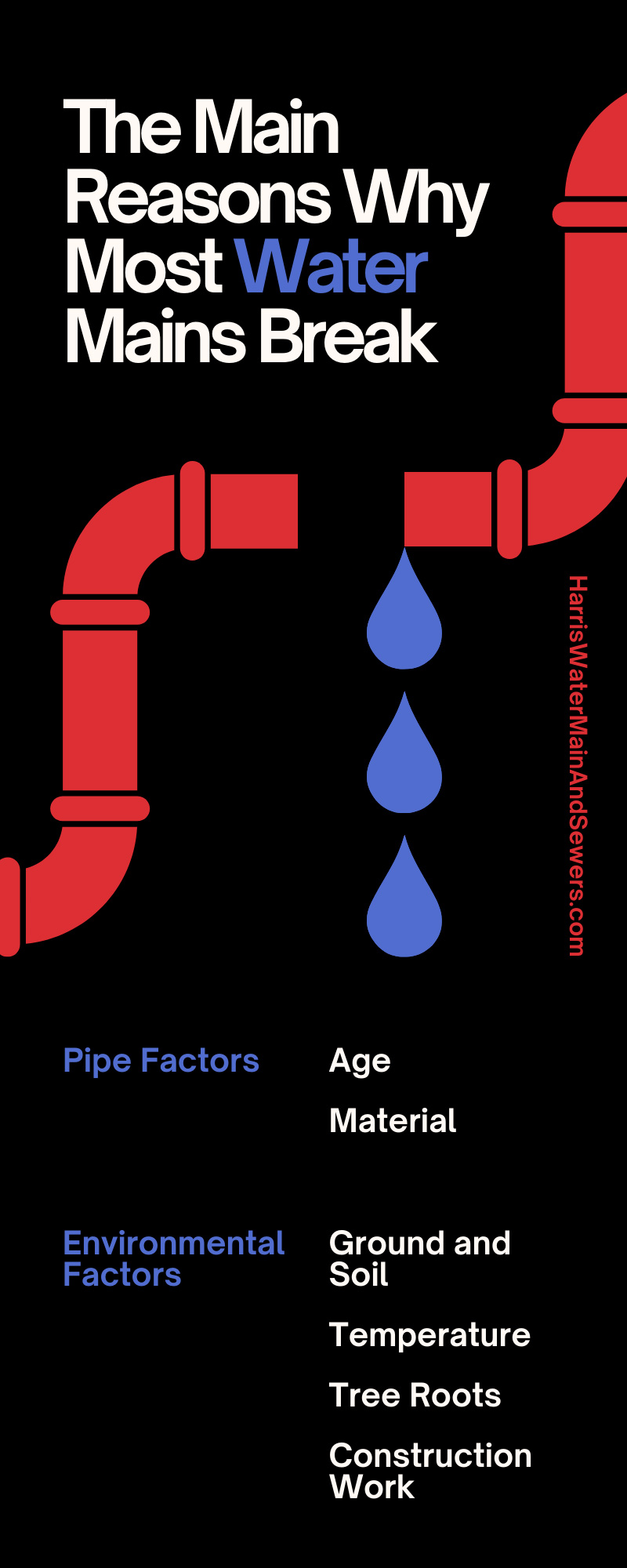When an underground water main breaks, leaks, or ruptures, it can cause a host of problems for individuals and communities. The damage to the street can disrupt traffic patterns, and the repairs can cost thousands of dollars. Additionally, it may create dangerous situations for nearby homes and businesses.
Water main breaks are common occurrences, but communities can avoid them with enough strategy. This simply requires an understanding of the potential dangers and the main reasons why most water mains break.
The Dangers of Water Mains Breaking
Typically, when one thinks of the effects of a water main break, they think of it in terms of the ways it can disrupt their schedule. However, it can also create a dangerous situation for everyone involved. Water main breaks are common causes of sinkholes, which can cause serious injury and property damage, including broken roads and even collapsing buildings. Almost more concerningly, water main breaks can contaminate water sources, leading to widespread waterborne illnesses. This is why authorities often advise against drinking water after a water main break.
With this much risk, prevention is essential. And prevention begins with knowing the common factors that lead to water main breaks. These factors typically fall under 2 categories: factors related to the pipes themselves and those related to the area surrounding the pipes.
Pipe Factors
Age
Naturally, the older a pipe is, the more likely it is to become brittle or damaged. And many cities have pipework that’s anywhere from 75 to 140 years old. For instance, New York City’s water system is approximately 85 years old in many places. Many of these pipes are well constructed and still functional, but eventually, time will take its toll, leading to breaks.
Material
Water mains are made from a variety of materials, each with its own set of advantages and disadvantages. The main varieties are:
- Cast iron
- Galvanized steel
- Clay
- Polyvinyl chloride
- Acrylonitrile butadiene styrene
Different types of materials have different levels of durability, which can change over time. Cast-iron pipes, which people stopped using in the 1980s, are more likely to wear down over time, while other types may be more likely to break down because of other environmental factors. We’ll discuss these factors below.
Environmental Factors
Ground and Soil
From the outside, it may seem as though the ground rarely moves. However, over time, the ground goes through a process called “settling,” where the soil subtly shifts, usually in a downward direction. In home construction, this is what causes houses to sink into the ground over time, potentially causing foundational damage. But for water mains, this shifting soil can potentially put greater stress on pipes, which can cause pipes to age more quickly.
Additionally, the type of soil may also speed up the corrosion process in cast-iron pipes. Soils with high amounts of chlorine and sulfate—such as soil near irrigation sites or soil with high concentrations of salt from seawater or road salt—are known to cause quicker corrosion.
Temperature
Water main breaks are especially common in the winter, and the reason is the sudden drop in temperature. Extremely cold temperatures can cause the surface of pipes to become brittle. At the same time, the ground tends to expand as it freezes, putting added pressure on the already fragile pipes and leading to bursts. This becomes an issue both when the pipes freeze and when they thaw out afterward. As the pipes expand and contract, this creates an ideal scenario for cracks to form.
Tree Roots
Tree roots can grow a far distance from the rest of the tree, with the total area of the roots spreading as far as 3 times the size of the canopy. Because of this, trees that seem a safe distance away from a water main system may still disrupt it. This is especially true given root systems’ tendency to grow toward places where water is flowing.
Construction Work
Even if the pipes are in good condition and the surrounding soil isn’t causing added pressure, construction work in the area may cause problems for water mains. Heavy-duty equipment such as excavators and drills can easily break through piping to cause breaks. Even smaller-scale equipment such as shovels can cause cracks if the piping is worn out.
Quick Tips for Avoiding Water Main Breaks
Once you’re aware of why water mains break, preventing breaks becomes a simple matter of addressing the risk factors before they can cause problems. A few key strategies to protect a community’s water main lines include:
- Replacing old water systems with plastic
- Contact community officials before any major digging projects
- Shut off water valves before going out of town for extended periods
- Make sure all areas of residential and commercial buildings are well-heated in the winter
- Be aware of areas prone to soil erosion
- Encourage people to report water pressure issues
Some factors—settling ground or soil erosion, for example—cannot be avoided. Because of that, most prevention amounts to being aware of the signs of potential water issues, such as low water pressure or water pooling outside. Having the ability to catch a water main issue early can mitigate damage.
What To Do When a Water Main Breaks
When you suspect there’s a water main break, taking action immediately is essential—especially considering the potential dangers and risks associated with it. Here in New York, that means filling out a report on the city’s official website. From here, you can contact a certified master plumber to take care of the issue in a timely manner. Avoid trying to take care of the pipe yourself. Doing so could be dangerous for you and lead to further damage to the pipe or to water contamination in the surrounding area.
If you’re looking for the most trusted names in water main repair in NYC, you can count on Harris Main and Water Sewer Contractors. We have been serving the 5 boroughs for the last 100 years, and we can repair or replace the water main in your area.





















